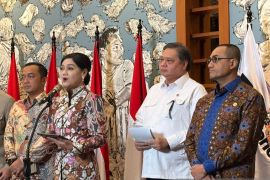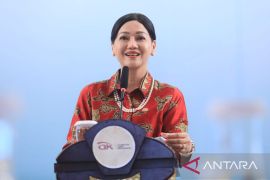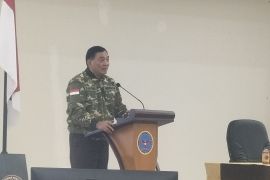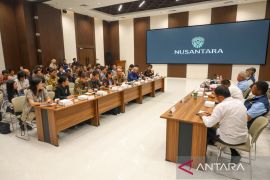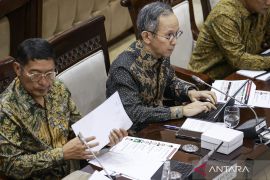Some political observers, at first, had doubted that KPU would be able to meet the deadline because there were many complaints and protests particularly about alleged fraud during the vote count and recapitulation processes at a number of local poll stations or in the provincial-level KPU offices.
In a number of places, the votes had to be counted once again because of some suspicions, while in regions such as Sampang (Madura, East Java), Bali, and South Nias (North Sumatra), re-voting had to be carried out because of alleged fraud, violations, or technical problems.
Despite the mounting problems, KPU determined to finish the vote count and recapitulation at the national level before the May 9 deadline, and invited those who were not satisfied with the election results, to file complaints with the Constitutional Court (MK), which has been tasked to solve any dispute concerning the election results.
Indonesias parliamentary elections with more than 185.8 million voters registered to vote in over 545 thousand polling stations, was considered as the largest and most complicated single-day poll in the world. The elections ran peacefully on April 9, 2014.
This years parliamentary election was contested by 12 national political parties and three local parties in Aceh Province.
"I hereby announce the KPU decision No.411/kpts/KPU/2014 on the Validation of the Voter Turnout of the 2014 General Elections of the Members of the House of Representatives (DPR), Regional Representative Council (DPD), Provincial Legislative Assembly (DPRD I) and District/City Legislative Assembly (DPRD II)," KPU Chairman Husni Kamil Manik said in Jakarta, on May 9.
The 2014 legislative election results are as follows:
1. National Democrat Party (Nasdem): 8,402,812 (6.72 percent)
2. National Awakening Party (PKB): 11,298,957 (9.04 percent)
3. Prosperous Justice Party (PKS): 8,480,204 (6.79 percent)
4. Indonesian Democratic Party of Struggle (PDIP): 23,681,471 (18.95 pct)
5. Golongan Karya (Golkar): 18,432,312 (14.75 percent)
6. Greater Indonesia Movement (Gerindra): 14,760,371 (11.81 percent)
7. Democrat Party (PD): 12,728,913 (10.19 percent)
8. National Mandate Party (PAN): 9,481,621 (7.57 percent)
9. United Development Party (PPP): 8,157,488 (6.53 percent)
10. Peoples Conscience Party (Hanura): 6,579,498 (5.26 percent)
11. Crescent and Star Party (PBB): 1,825,750 (1.46 percent)
12. Indonesian Justice and Unity Party (PKP): 1,143,094 (0.91 percent)
The total valid votes in 33 provinces were 124,972,491.
Based on the results, two political parties, PBB and PKPI, failed to achieve the Parliamentary threshold of 3.5 percent of votes.
As KPU concluded its tasks regarding the legislative elections, the Constitutional Court (MK) started to deal with suits filed to contest the election results.
In line with the existing law, political parties and the Regional Representative Council (DPD) candidates were given three days to file complaints after the announcement of the legislative election results. The deadline to file suits with MK was on Monday, May 12, at midnight.
Fourteen political parties consisting of 12 national political parties and two Aceh local parties, have filed complaints with MK. In every province, except Yogyakarta, political parties complained about the vote count and recapitulation results.
"Until 11.51 p. m. local time on Monday, complaints had been filed by 14 political parties, consisting of 12 national political parties and two local parties from Aceh. One local political party in Aceh, the Aceh Party, did not file any suit," MK Secretary General Janedjri M Gaffar Gaffar said in Jakarta on Tuesday (May 13).
In total, MK has received complaints concerning 702 cases in the 2014 legislative elections, an increase from 628 cases in 2009.
"Ive calculated the average party filed a lawsuit in 2009 to 17 cases. However, in 2014 the average one party filed complaints concerning 48 cases," he added.
"In several provinces, more than two parties have filed suits. There are two complainers in Southeast Sulawesi, two in East Java, two in West Papua, four in Papua, two in North Maluku, two in Maluku, and two in North Sumatra," Gaffar said.
Besides, 30 candidates of the Regional Representative Council (DPD) members from 19 provinces have also lodged protests with the MK. The number of DPD candidates filing suits against the results of the legislative election 2014 increased from that in 2009.
"In the legislative election 2009, the number of DPD candidates who filed complaints was 27, and in 2014 the number increases to 30," he noted.
The Constitutional Court (MK) had fixed Thursday, May 15, as the deadline for the complainers to complete the documents for the election result disputes.
"MK is ready to deal with election disputes. Three panels have been set up," Gaffar said on Monday (May 12).
The first panel consists of MK Chairman Hamda Zoelva as the chairman, and the members are constitutional judges Muhammad Alim and Wahiduddin Adam. The second panel comprises MK Deputy Chairman Arief Hidayat as the panels chairman, and Patrialis Akbar and Anwar Usman as members. The third panel consists of constitutional judge Ahmad Fadlil Sumadi as the chairman, and Maria Farida and Aswanto as members.
Each panel will be supported by a task force comprising court clerks, analysts and IT experts to verify and process data relating to disputed election results. The court has also set up video conference facilities in 42 universities in 34 provinces to help witnesses testify remotely.
The law also stipulates that the court has only 30 days to resolve the disputes after they have been registered.
"Were optimistic we will be able to finish all the cases in 30 days," chief justice Hamdan Zoelva said recently.
The Constitutional Court has stated that whatever ruling it would issue in dealing with the disputes, it would not affect the nomination of presidential candidates for the presidential election scheduled to be held on July 9, 2014. (*)
Reporter: Fardah
Editor: Fardah Assegaf
Copyright © ANTARA 2014

